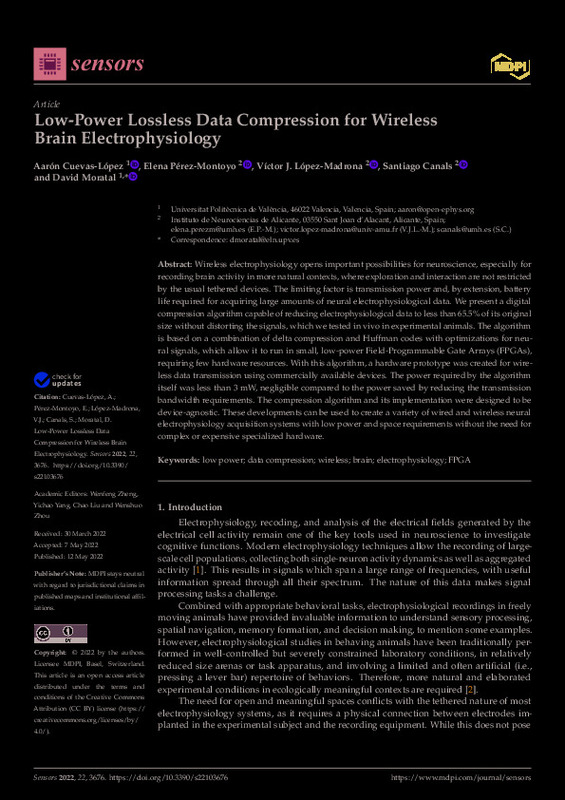JavaScript is disabled for your browser. Some features of this site may not work without it.
Buscar en RiuNet
Listar
Mi cuenta
Estadísticas
Ayuda RiuNet
Admin. UPV
Low-Power Lossless Data Compression for Wireless Brain Electrophysiology
Mostrar el registro sencillo del ítem
Ficheros en el ítem
| dc.contributor.author | Cuevas-López, Aarón
|
es_ES |
| dc.contributor.author | Pérez-Montoyo, Elena
|
es_ES |
| dc.contributor.author | López-Madrona, Víctor J.
|
es_ES |
| dc.contributor.author | Canals, Santiago
|
es_ES |
| dc.contributor.author | Moratal, David
|
es_ES |
| dc.date.accessioned | 2023-04-20T18:00:37Z | |
| dc.date.available | 2023-04-20T18:00:37Z | |
| dc.date.issued | 2022-05 | es_ES |
| dc.identifier.uri | http://hdl.handle.net/10251/192888 | |
| dc.description.abstract | [EN] Wireless electrophysiology opens important possibilities for neuroscience, especially for recording brain activity in more natural contexts, where exploration and interaction are not restricted by the usual tethered devices. The limiting factor is transmission power and, by extension, battery life required for acquiring large amounts of neural electrophysiological data. We present a digital compression algorithm capable of reducing electrophysiological data to less than 65.5% of its original size without distorting the signals, which we tested in vivo in experimental animals. The algorithm is based on a combination of delta compression and Huffman codes with optimizations for neural signals, which allow it to run in small, low-power Field-Programmable Gate Arrays (FPGAs), requiring few hardware resources. With this algorithm, a hardware prototype was created for wireless data transmission using commercially available devices. The power required by the algorithm itself was less than 3 mW, negligible compared to the power saved by reducing the transmission bandwidth requirements. The compression algorithm and its implementation were designed to be device-agnostic. These developments can be used to create a variety of wired and wireless neural electrophysiology acquisition systems with low power and space requirements without the need for complex or expensive specialized hardware. | es_ES |
| dc.language | Inglés | es_ES |
| dc.publisher | MDPI AG | es_ES |
| dc.relation.ispartof | Sensors | es_ES |
| dc.rights | Reconocimiento (by) | es_ES |
| dc.subject | Low power | es_ES |
| dc.subject | Data compression | es_ES |
| dc.subject | Wireless | es_ES |
| dc.subject | Brain | es_ES |
| dc.subject | Electrophysiology | es_ES |
| dc.subject | FPGA | es_ES |
| dc.subject.classification | TECNOLOGIA ELECTRONICA | es_ES |
| dc.title | Low-Power Lossless Data Compression for Wireless Brain Electrophysiology | es_ES |
| dc.type | Artículo | es_ES |
| dc.identifier.doi | 10.3390/s22103676 | es_ES |
| dc.rights.accessRights | Abierto | es_ES |
| dc.contributor.affiliation | Universitat Politècnica de València. Escuela Técnica Superior de Ingenieros Industriales - Escola Tècnica Superior d'Enginyers Industrials | es_ES |
| dc.description.bibliographicCitation | Cuevas-López, A.; Pérez-Montoyo, E.; López-Madrona, VJ.; Canals, S.; Moratal, D. (2022). Low-Power Lossless Data Compression for Wireless Brain Electrophysiology. Sensors. 22(10):1-19. https://doi.org/10.3390/s22103676 | es_ES |
| dc.description.accrualMethod | S | es_ES |
| dc.relation.publisherversion | https://doi.org/10.3390/s22103676 | es_ES |
| dc.description.upvformatpinicio | 1 | es_ES |
| dc.description.upvformatpfin | 19 | es_ES |
| dc.type.version | info:eu-repo/semantics/publishedVersion | es_ES |
| dc.description.volume | 22 | es_ES |
| dc.description.issue | 10 | es_ES |
| dc.identifier.eissn | 1424-8220 | es_ES |
| dc.identifier.pmid | 35632085 | es_ES |
| dc.identifier.pmcid | PMC9147146 | es_ES |
| dc.relation.pasarela | S\483884 | es_ES |
| dc.subject.ods | 03.- Garantizar una vida saludable y promover el bienestar para todos y todas en todas las edades | es_ES |
| upv.costeAPC | 2360 | es_ES |








